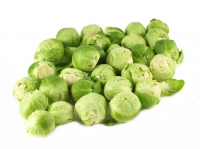
Canny vegetable gardeners start thinking about what to grow next winter as soon as the last one is finished. Take time out from the spring rush to think about what you'll grow in the coldest months of the year and you'll reap the rewards in fat cabbages, nutty Brussels sprouts and kale when there's little else around to pick.
The range of veg you can enjoy in winter is extraordinary, and from late spring onwards you'll find a huge variety on sale as plug plants and seeds in your favourite garden centre. Look out for delicacies like long-cropping 'Dwarf Green Curled' kale, burgundy 'Rubine' sprouts, pretty red 'Rhubarb' chard or knobbly gourmet root vegetable Celeriac 'Prinz'.
Winter veg plants often take a long time to grow, so get winter brassicas, leeks, parsnips, swede and celeriac in the ground from late spring. Faster growing chard, winter spinach and salads can wait till August: sow to follow on from potatoes or onions to keep your veg garden productive year-round.
A time-honoured way of keeping slow-growing brassicas out of the way while you enjoy earlier crops is a nursery bed. This is a separate area – often a raised bed or cold frame – for sowing rows of brassicas direct. Thin seedlings as they grow, then in June dig them up and transplant into beds just vacated by early broad beans, peas or lettuces.
If you haven't room for a nursery bed, you can still grow early crops in between generously-spaced brassicas like Brussels sprouts plants, usually sown around 60cm apart. While they're still small, use the space between the seedlings for an extra crop of carrots, salads, spinach or beetroot. The faster crop will be out of the ground well before the brassicas are big enough to overshadow them, giving you twice the crop from the same amount of space.




